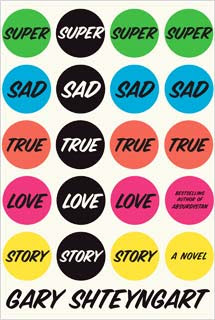Super Sad True Love Story by Gary Shteyngart
/ This is the first book I have read that take on the decline on the US through the “entertainment”/connectivity development we see now. It is an interesting example on how many western people see China as a "threat" that are beyond the control of anything the west (US) can do.
The part where US wants to impress the visiting person (the head of China's Central Bank and "probably the most powerful person on the planet") by showing that the US can still innovate is brilliant.
This is the first book I have read that take on the decline on the US through the “entertainment”/connectivity development we see now. It is an interesting example on how many western people see China as a "threat" that are beyond the control of anything the west (US) can do.
The part where US wants to impress the visiting person (the head of China's Central Bank and "probably the most powerful person on the planet") by showing that the US can still innovate is brilliant.
In many ways I would describe this book as the Bukowski version of Daemon (the brilliant book by Daniel Suarez that everyone interesting in technology should read). The need to stay connected and the focus on instant gratification is not very sophisticated, but therefore also very effective. Letting all key characters (almost) be outside the main events in society is and efficient way to create a feeling of lost control. A feeling that seem to drive many in our society into situations where they work without much reflection or thought about any broader consequences of their actions.
The main character is such a sad person that it is hard not to see him as the perfect caricature of a US "intellectual" today.
Sometimes it feels a little to much focus on sex/nudity, but then you realise that this is where we are heading if media/PR/TV continue on the path we are on today. I hope people in the PR/lobbying/entertainment sector think a little about where things are heading and if they are helping to make a "super sad true love story" a reality.
Maybe even take the time to read Simmel, perhaps The Philosophy of Money.


































